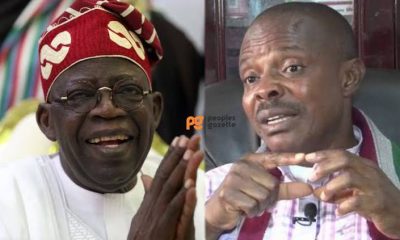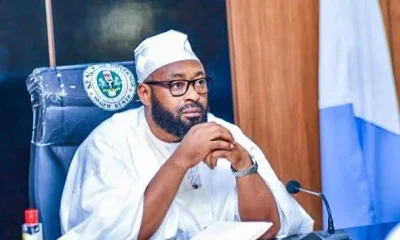News
Sacked CBN workers fault dismissal, seek reinstatement

Former employees of the Central Bank of Nigeria (CBN) are grappling with the shock of their sudden dismissal, accusing the management of maltreatment and injustice.
They claimed that many were not paid their entitlements before their sacking, a move they argued violates the bank’s human resource rules and policy.
In a statement on Sunday in Jos, Plateau State capital, the North Central Coordinator of the Conference of Autochthonous Ethnic Communities Development Association Youth Wing, Paul Dekete, called for the immediate reinstatement of the sacked workers.
The statement read: “The purge wasn’t limited to high-level executives. It extended far beyond directors, impacting Deputy Directors and Assistant Directors who formed the backbone of departmental operations. These were not junior staff; they were seasoned professionals with deep institutional knowledge.
“For example, the Director of Information Technology was overseeing crucial projects on the very day they were terminated, including efforts to secure international information security certifications for the bank.
“In a particularly egregious case, a Director on special assignment, tasked with leading the bank’s efforts to secure an ISO certification for information security, was sacked on the very day the bank successfully achieved this crucial milestone.
“Central banking relies heavily on robust cybersecurity measures, and this certification is a testament to the Director’s competence and the bank’s commitment to financial security. This abrupt dismissal, on the day of a major accomplishment, raises serious questions about the planning and rationale behind the mass layoffs.”
The statement further said, “The mass sack violated the bank’s own HR policy, which mandates board approval for executive terminations.
“This blatant disregard for due process has raised serious questions about transparency. The CBN, a federal institution, must adhere to public service rules. This dismissal exercise, carried out without board approval, lacks a solid legal foundation.
“Making matters worse, the bank offered no clear criteria for the mass sacking. This is a stark departure from their established culture of clear communication with staff during downsizing exercises.”
Dekete, on behalf of the sacked CBN workers further said, “Loyal employees, some with over 30 years of dedicated service, were cast aside with a cold, impersonal letter stating “your services are no longer required.” This callous act extended to a Deputy Director who was let go even though she had already completed all the necessary paperwork and her retirement letter was ready to be issued.
“The human cost of this heartless exercise is staggering. Many staff members had used their salaries as collateral for loans tied to their remaining years of service at the CBN. With their abrupt termination, these loans were immediately deducted from their final paychecks, leaving some with nothing and others still indebted to the bank. The impact on these individuals and their families is devastating, with their dreams and financial security shattered in an instant.
“The CBN’s purge extended beyond individual hardship, raising serious concerns about ethnic bias. Reports indicate that some states saw over 80% of their executive staff removed, with North Central and South Eastern regions disproportionately affected. This blatant disregard for the principle of federal character raises troubling questions about the bank’s commitment to national unity.
“Staff morale has plummeted, with a pervasive sense of fear and uncertainty gripping the institution. Every Friday is met with dread, as rumours swirl of another list of targeted employees. The reported use of an external consultant, seemingly unfamiliar with the bank’s HR policies and civil service regulations, only exacerbates the lack of trust and transparency.”
The CBN’s mass dismissal included the entire Economic Intelligence Unit (EIU), a Unit in the bank tasked with the critical function of identifying and monitoring illegal financial activities within Nigeria. Established in 2018, the EIU was meticulously built by cherry-picking the bank’s brightest minds across various departments.
According to Dekete, the loss of these highly trained professionals represents a significant blow to the bank’s institutional knowledge and capacity to combat money laundering and other illicit financial activities.
He noted that the nature of the sack shows an attempt to cripple the Middle-belt region of the state as Gombe, Plateau and Benue are affected most.
News
Reps Begin Work on New Electoral Act Amid Heated Debates

By Gloria Ikibah
The House of Representatives has begun deliberations on a new Electoral Act intended to guide the conduct of the 2027 general elections.
Proceedings were tense and disorderly for much of the session, with lawmakers frequently attempting to speak at the same time and repeatedly raising points of order, creating a noisy and charged atmosphere on the floor of the House.
At the outset, members spent considerable time arguing over which sections of the bill should be examined and which should be set aside.
The deadlock was eventually resolved when the House agreed to focus on provisions recommended by the Committee on Electoral Matters.
One of the key decisions approved was that all pre-election disputes must be handled exclusively by the Federal High Court located in the state where the matter arises.
The chairman of the committee explained that the amendment is aimed at stopping the practice of transferring pre-election cases from their states of origin to the Federal Capital Territory or other states without proper jurisdiction.
However, sharp divisions emerged over a proposal seeking to disqualify any candidate found to have supplied false information regarding constitutional eligibility, along with the candidate’s political party. The provision sparked intense debate and strong opposition from several members, signalling further contention as deliberations continue.
Many of the lawmakers insisted that rather than disqualify the candidate and his party, and declaring the candidate with the next highest votes cast after the election as winner, INEC should be asked to conduct a fresh election excluding the candidate and his party.
Others insisted that the recommendations was apt as it makes it mandatory for the political parties to do due diligence before presenting any candidate for any election.
The also approved a jail term of five years for any returning officer who declare false results at an election and a ten year jail term for failing to record election results in a proscribed form, but went ahead to announce such result, while prescribing a two year jail term for a Resident Electoral Commissioners who fail to release Certified True Copies of election results.
The House however defered consideration of the report till Thursday for continuation.
News
Reps Vow To Probe Treaties, Protocols and Agreement Signed by Nigeria

By Gloria Ikibah
The House of Representatives has commenced investigation into all Treaties Protocols and agreement signed by Nigeria and other countries.
The Chairman House Committee on Treaties, Protocols & Agreements, Rep. Rabiu Yusuf, made the disclosure on Wednesday at a press briefing in Abuja.
He said the House of Representatives has authorised the Committee to undertake one of the most important national reviews in recent history.
Yusuf noted that the review is not political but patriotic, constitutional, and essential for Nigeria’s sovereignty, debt sustainability, and economic security.
He said: “Our mandate is clear: to examine all bilateral and multilateral treaties, protocols, agreements, and foreign-funded contracts Nigeria has entered into and determine whether they protect or endanger the national interest”.
The Chairman explained that over the years, Nigeria has signed numerous treaties, MoUs, and agreements, many without adequate oversight, domestication, or monitoring.
“Some agreements contain hidden obligations, sovereignty waivers, unfavourable arbitration clauses, or financial risks unknown to Nigerians. Several foreign-funded infrastructure contracts, especially those involving foreign companies, require deeper scrutiny for: Value-for-money, Loan exposure, Local content compliance, Contract performance, Environmental and labour compliance.
” Nigeria cannot afford treaties that weaken our legal authority, compromise national assets, or burden future generations with unsustainable liabilities”, he added.
Yusuf assured that the committee will ensure that all international agreements comply with Section 12 of the 1999 Constitution as amended.
“Ensure Nigeria’s sovereignty is never compromised in foreign dealings. Protect the country from harmful financial exposure, poor contract terms, and non-performing obligations.
“Establish full transparency around treaties and major contracts. Strengthen Nigeria’s negotiation power going forward. Recommend a national framework for Treaty Oversight & Digital Tracking to
prevent future lapses”, he said.
The Chairman said that the investigation was important because treaties affect everyday life, job creation, trade, taxes, infrastructure, and foreign investment.
He noted that poorly negotiated agreements can weaken Nigeria’s economy, increase debt, or even threaten strategic national assets.
“This Committee’s work will help ensure Nigerians benefit from partnerships, not become victims of them. Our goal is simple: Nigeria must never sign what it cannot defend”, he said.
He said that letters requesting all relevant documents will be dispatched to: Federal Ministries, MDAs, Regulatory bodies, State governments, Chinese companies and other foreign contractors, Diplomatic missions, Banks and financial institutions.
Rep. Yusuf further emphasised that the committee expects full cooperation and transparency in documentation, submission of complete agreements, annexes, side letters, payment records,
project reports, and compliance documents.
He also said that Nigeria deserves agreements that uplift, not undermine her.
“This investigation will be thorough, professional, non-partisan, and guided strictly by evidence.
“This Committee will work transparently, responsibly, and with the highest national interest. We are determined to deliver a report that will strengthen Nigeria’s sovereignty,
protect public resources, and reform how treaties are negotiated in the future.
“Nigeria will no longer sign unfavourable agreements in darkness. This Committee will shine the light, protect our sovereignty, and ensure every treaty reflects the dignity and future of our nation”., Yusuf added.
News
Emeka Nwala emerges president African Legislative Aides Association(Photos)

Nigerian, Chairman of 10th National Assembly Legislative Aides (NASSLAF) High Chief Barr Emeka Nwala has emerged as the president of African Legislative Aides Association (ALAA) with Abdulmohemin Tumia from Libya as the deputy president respectively.
This historic event took place at the ongoing African Legislative Aides Conference ALAC 2025 at NAF Conference centre Abuja, Nigeria.
Ajikwa Chia Christopher Principal Special Assistant (PSA) to High Chief Barr Emeka Nwala, the Executive Chairman of the 10th NASSLAF cum President African Legislative Aides Association (ALAA).
-

 News16 hours ago
News16 hours agoSenate okays Oke, Are, Dalhatu for appointment as ambassadors
-

 News6 hours ago
News6 hours ago“Majority of Tinubu’s ministers should be in jail”-APC top notch declares
-

 News16 hours ago
News16 hours agoAircraft crashes in Owerri with four persons onboard
-

 News16 hours ago
News16 hours agoPSG Dominate As FIFA Announces 2025 ‘The Best’ 11 Award For Men, Women [FULL LIST]
-

 News16 hours ago
News16 hours agoSenate Passes MTEF/FSP, Says 2026 Budget To Be Presented This Week
-

 News16 hours ago
News16 hours agoInsecurity: Tinubu in late night parley with Labour, NGF ahead of planned protest
-

 News16 hours ago
News16 hours agoNiger State: Gov Bago sacks 30 special advisers
-

 News7 hours ago
News7 hours agoHoR Rivers caucus leader, Dekor bags 2025 Leadership award, dedicates it to constituents and Wike(Video/Photos)










You must be logged in to post a comment Login